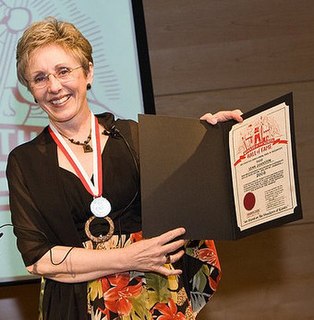A Quote by Muriel Spark
She wasn't a person to whom things happen. She did all the happenings.
Quote Topics
Related Quotes
People said things they didn't mean all the time. Everybody else in the world seemed able to factor it in. But not Lena. Why did she believe the things people said? Why did she cling to them so literally? Why did she think she knew people when she clearly didn't? Why did she imagine that the world didn't change, when it did? Maybe she didn't change. She believed what people said and she stayed the same." (Lena, 211)
The doctor's wife wasn't a bad woman. She was sufficiently convinced of her own importance to believe that God actually did watch everything she did and listen to everything she said, and she was too taken up with rooting out the pride she was prone to feeling in her own holiness to notice any other failings she might have had. She was a do-gooder, which means that all the ill she did, she did without realizing it.
[Short Talk on Sylvia Plath] Did you see her mother on television? She said plain, burned things. She said I thought it an excellent poem but it hurt me. She did not say jungle fear. She did not say jungle hatred wild jungle weeping chop it back chop it. She said self-government she said end of the road. She did not say humming in the middle of the air what you came for chop.
I think that Eleanor Roosevelt really learned about the limits of power and influence from Arthurdale. She could not make some things happen. And she particularly learned that she could not, just because she was nominally in charge, she could not change people's hearts and minds; that a very long process of education would result before race was on the national agenda. And it really did move her into the racial justice arena with both feet. She came out fighting.
My mother was the first African-American policewoman in Seattle - recruited, actually - and she did it for only 2 years, as she did not want to carry a gun. She worked mostly on domestic disturbances. The NAACP wanted her to do it. She did not actually have the temperament to be a cop - she was very sweet. She had a Masters in social work.
It was always the same; other people gave up loving before she did. They got spoilt, or else they went away; in any case, they were partly to blame. Why did it happen so? She herself never changed; when she loved anyone, it was for life. She could not understand desertion; it was something so huge, so monstrous that the notion of it made her little heart break.
The world is wrong. You can't put the past behind you. It's buried in you; it's turned your flesh into its own cupboard. Not everything remembered is useful but it all comes from the world to be stored in you. Who did what to whom on which day? Who said that? She said what? What did he just do? Did she really say that? He said what? What did she do? Did I hear what I think I heard? Did that just come out of my mouth, his mouth, your mouth? Do you remember when you sighed?







































